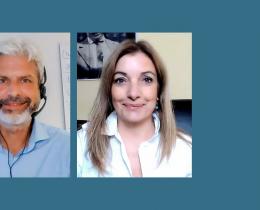Omega: Can you explain how the brain’s way of learning sets us up for addiction?
Dr. Jud: Our brains operate with a reward-based learning system, or habit loop, that has a couple of key pieces: a trigger, a behavior, and a reward. This evolved to help us remember where food is. If we were hungry and we saw a berry (the trigger) and we ate it (the behavior), the stomach then sent a dopamine signal to our brain (the reward) that said, “That was good! Remember what you just ate and where you found it.”
That’s reward-based learning. A context-dependent memory gets laid down to help us remember where sources of food are.
In our modern day, there are cues and triggers all over the place, and the brain links all sorts of things that aren’t meant to go together, like associating eating with stress (or celebration) or linking anxious sensations and worry. When we have an uncomfortable sensation or emotion (trigger), we try to think our way to a solution (behavior). When we can’t solve the problem, that thinking turns into worry. Cigarettes, opioids, alcohol—all these follow the same pathway.
Omega: How can we break this cycle?
Dr. Jud: If we understand how the pathway works, we can then target it in a way that will provide an effective solution. What we've found is that mindfulness training helps directly target this reward-based learning system.
Let’s use stress as an example. When we’re stressed, we might get some temporary relief by distracting ourselves by eating a cupcake or feeling in control by ruminating about something. Instead, if we can simply bring awareness to the process of what craving feels like. That allows us to be with whatever those sensations are without getting sucked into them.
If we can do that, that actually hacks the system because two things happen. First, we begin to see more clearly that these "solutions" that we keep trying only provide temporary relief. They don't actually fix the problem. Second, we experience that awareness itself feels better than acting on and indulging in these behaviors.
Omega: It seems like we can be aware of the cycle we’re stuck in but unable to make a different decision. Is awareness the whole story?
Dr. Jud: To have awareness you have to be curious. Curiosity, in a sense, becomes the substitute behavior in this pattern. Curiosity actually feels pretty good. If we can train ourselves to be curious, that substitution of curious awareness for whatever our habitual behavior is helps us step out of the process by hacking the process itself—because curiosity feels better than indulging that craving.
Omega: You talk about love being subject to this process too. How does that work? What’s going on if, for example, someone has strong feelings for another person but that person doesn’t reciprocate? Are those feelings real?
Dr. Jud: If you have unrequited love—and I've certainly been there myself—it just causes suffering because it's not matching up with reality. The reality is you’re feeling these feelings, and they're not reciprocated. But the real question is, do those feelings actually serve you or not? Probably not. So feeling them or acting on them is not the most skillful thing to do, because it's not going to fix or change anything. It's not going to make anything better.
The same is true for drug addiction. If we have an urge to smoke crack cocaine or use heroin, it's probably not going to help us do our job or live a healthy life.
So what do we do with these feelings or cravings? That's the real question. Whether we act on them or try to resist them, they just get stronger. Indulging feeds the loop and resisting it makes it push against us even stronger.
Omega: So you don’t go down the road of resistance and you don’t go down the road of indulgence. What do you choose instead?
Dr. Jud: You choose curiosity. Curiosity is a totally different road, and it’s positively rewarding because it actually feels good. When we can really be curious and ask ourselves what it feels like when we’re caught up in infatuation (or any other craving), we realize, “Oh, wow! It’s this. And now it’s this. And it’s that sensation and that thought.” We see that the sensations and thoughts come and go. And as we do, we realize there’s not a moral imperative to act on any of it.



